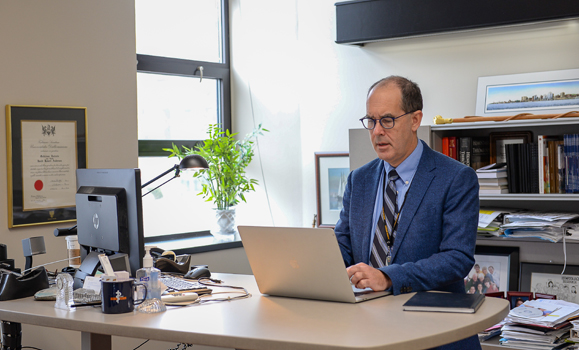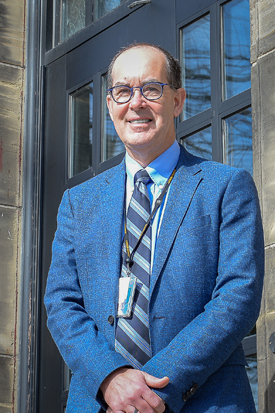This article is part of a series shining a spotlight on the personalities and priorities of Dal's senior leadership team. Revisit previous profiles at the Leadership and Vision website.
Dr. David Anderson became ╣·├±▓╩Ų▒ŌĆÖs 13th dean of medicine on July 1, 2015.
Born and raised in Halifax, Dr. Anderson graduated from ╣·├±▓╩Ų▒ Medical School in 1983. He completed an internal medicine residency at ╣·├±▓╩Ų▒ and went on to McMaster University for additional training in hematology. While studying at McMaster, he held a research fellowship in thromboembolic disease.
In 1992, Dr. Anderson returned to Nova Scotia. He joined the QEII Health Sciences Centre (QEII HSC) as a staff hematologist and ╣·├±▓╩Ų▒ Medical School as an assistant professor.
Not long before deanship, Dr. Anderson was head and district chief of the ╣·├±▓╩Ų▒ŌĆÖs Department of Medicine. Under his watch, the Department of Medicine developed a strategic plan that lead to major new initiatives in clinical care, education and research.
ŌĆ£Although IŌĆÖm a ╣·├±▓╩Ų▒ Medical School grad (Class of ŌĆÖ83), and have worked in a variety of roles over the years, I continue to be impressed by the scope and the complexity of the work that goes on here. I love meeting with many people who have diverse and integral roles here at the medical school; theyŌĆÖre proud of all that weŌĆÖre achieving, and are committed to making us as successful as we can be.ŌĆØ

An accomplished teacher and mentor, Dr. Anderson has been a member of countless university and hospital committees. HeŌĆÖs also worked with the Nova Scotia Department of Health and Wellness ŌĆō as clinical advisor for the Nova Scotia Blood Program and in the development of the new academic funding plan (AFP) process for clinical departments.
In addition to his responsibilities as dean, Dr. Anderson maintains his clinical practice at the QEII HSC.
ŌĆ£I think it has been important for me as Dean to maintain a clinical practice.┬Ā Seeing patients in my weekly clinic has enabled me to keep up my skills as a hematologist.┬Ā It also is challenging and fun to stay engaged with patient care and to teach residents and students.┬Ā Being on call is more of a challenge. Great colleagues and residents have made this very feasible for me as well.ŌĆØ
With more than 150 peer-reviewed publications to his name, Dr. AndersonŌĆÖs contributions to research have led to national and international recognition. HeŌĆÖs a founding member and former chair of the VECTOR Research Group, a multi-centre Canadian collaborative team focused on studying blood clotting disorders that, to date, has received more than $50 million in funding. HeŌĆÖs also chaired the Department of MedicineŌĆÖs research committee for nearly 10 years, and was appointed ╣·├±▓╩Ų▒ Medical SchoolŌĆÖs assistant dean of clinical research in 2010.
A competitive tennis player and family man, heŌĆÖs married to Michelle Karis. Together, they have three children: Phillip, Deanne and Karis.ŌĆā
 On celebrating 150 years of medical educationŌĆ”
On celebrating 150 years of medical educationŌĆ”
ŌĆ£Our 150th anniversary was a busy and productive year and I am grateful we could celebrate our tremendous acco

